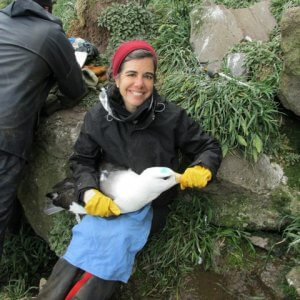Members, please login to view protected content.
Professor in the Department of Neurobiology, Physiology and Behavior at UC Davis
When John James Audubon proclaimed that birds lacked a sense of smell, the study of avian olfaction was doomed to suffer ridicule by ornithology text books for years to come. In recent years, ornithologists have renewed their interest into the sense of smell in birds leading to a new appreciation of their chemical ecology. The tubenosed seabirds (petrels and albatrosses) of the order Procellariiformes have among the most impressive olfactory abilities of any animal on earth. Species within this order spend most of their lives flying over the world’s oceans, returning to land each year or every other year, to breed and rear a single offspring. They tend to partner for life and show strong nest-site fidelity between breeding seasons. Much of my research career has focused on elucidating how procellariform species use olfaction to perform behaviors ranging from foraging and navigation to mate choice and individual recognition. My presentation will touch on some of our recent findings and hopefully convince you that olfaction is a rich field of study, and that questions related to sensory ecology are both important and applicable to scientific inquiry into the biology and conservation.
Dr. Gabrielle Nevitt is a leader in the field of vertebrate Chemical Ecology and has conducted pioneering research in the sense of smell in birds, focusing on procellariform seabirds. She graduated from Stanford University, received her PhD in Zoology from the University of Washington, and did postdoctoral training in the Department of Neurobiology and Behavior at Cornell University. She has been a professor in the Department of Neurobiology, Physiology and Behavior at UC Davis for 24 years. She lives with her family on a rural property with various birds including emus.

